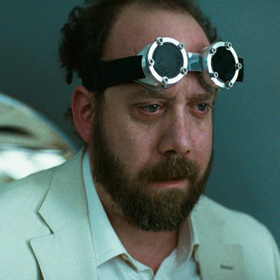Cold Souls

3.5/5
The most beautiful aspect of humanity exists within the specific qualities and characteristics of each unique personality. These distinctions are of course based on genetics and DNA, but also on experiences and how each person perceives the world. Inside the body we have a great many organs that allow people to exist, and yet we also have the untraceable soul that allows the human body to exhibit emotion. Cold Souls Directed by Sophie Barthes explores the possibility of life without a soul and the reality of what this could mean to a passion driven individual. If humanity had the option to live without feeling and conflict, would we take it; and if so, how could we survive. True happiness cannot live without the soul, because a true state of euphoria cannot exist without the possibility of sadness and regret. Cold Souls challenges the notion of reality and whether or not it is better to feel nothing than live in the depths of despair.
Cold Souls focuses on actor Paul Giamatti as he struggles to come to terms with his portrayal of the title role in Chekov’s gut wrenching play Uncle Vanya. Giamatti embraces the inner workings of the character to the point where he cannot differentiate the two personas. As Giamatti approaches a downfall, he discovers a risky procedure that could temporarily rid him of his plagues by releasing him of his soul. The idea of soul storage seems to be an odd yet viable option for the actor as it promises nothing but peace and happiness. This other worldly idea toils with the possibility of living without the deep feeling and conflict that trouble humanity. By removing the soul, life can become “happy” or what he soon realizes is depthless and empty complacency.
Sophie Barthes makes the strong choice to maintain the identity of Paul Giamatti as both character and actor. This decision automatically skews the line between fiction and reality. Although the intellect allows the viewer to consider the absurdity of soul retraction, it does force the viewer to contemplate this possibility. Paul first hears about this unorthodox procedure from the well respected New Yorker and proceeds to make an appointment with the doctor to discuss the idea of living a burden free life. Although the actor questions the concept as preposterous, he continues with the process. Within days, and as a result of a several unaffected and heartless rehearsals of Uncle Vanya, Giamatti decides that living without a soul is detrimental to his career and his relationship with his wife played by Emily Watson. As an alternative option, Paul decides to borrow the soul of a Russian poet. Although he delivers a brilliant performance, it leaves Paul with the realization that nothing compares to his own. This conclusion to retrieve his original essence opens the door to reveal a world in which soul trafficking is a million dollar business and soul trading is a common procedure worldwide.
Barthes also focuses on the dichotomy of life and death by using the doctor office as a sort of heavenly getaway from everyday reality. As Paul sits and waits for his lost soul, we are brought into a white and seemingly blissful room free from color and substance. This atmosphere is meant to subtly personify the possibility of living as an empty vessel, although none of the characters seem to make this connection. If the office is in fact heaven, then the doctor is playing God bringing his unhappy patients to death. Paul soon realizes that a burdened existence is far superior to that of an emotionless and care free existence.
Cold Souls exists within the context of 97 minutes, which leaves the viewer a bit jolted from all the information and extreme detail given in such a short amount of time. Barthes creates a sort of distance separation between film and viewer as a way to force the audience into a version of Paul’s soul-less reality. Since Barthes develops a film that spurs from the reality and life of Paul Giamtti, we tend to embrace the fantastical direction of the Paul Giamatti within the context of Cold Souls. Different from most mainstream cinema, there is little effort to complete the storyline and therefore the audience is left to consider what happened to the man who lived without a soul.
Starring: Paul Giamatti, Emily Watson, David Straithairn, Dina Korzun, Katheryn Winnick
Director: Sophie Barthes
Runtime: 97 Minutes
Distributor: Samuel Goldwyn Films
Rating: PG-13
RELATED ARTICLES
Get the most-revealing celebrity conversations with the uInterview podcast!







Leave a comment